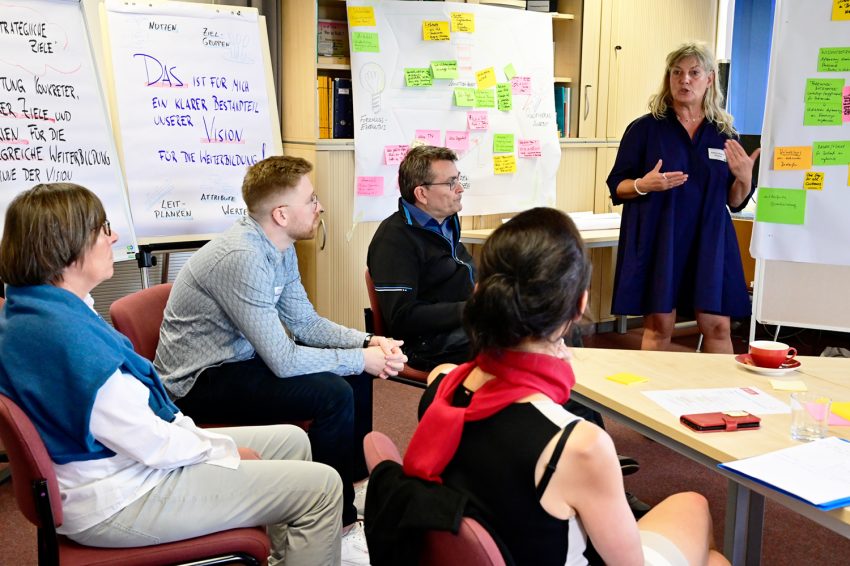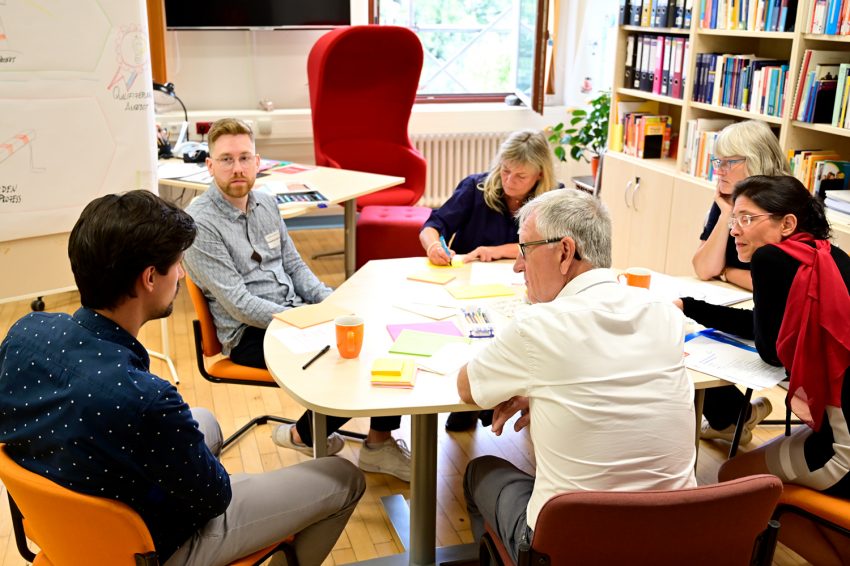Continuing education: Audit process begins with kick-off workshop Focus on target group-specific didactics
In February this year, Technische Universität Braunschweig was selected as one of five pilot universities for the Weiterbildungs-Audit of the Stifterverband and the Heinrich Nixdorf Foundation. The analysis phase of the audit started in Braunschweig with the kick-off workshop and will end with a two-day visit by the auditors at the end of January 2023. The goal is to strategically develop continuing education in science and to combine research expertise with didactic competence.

TU Braunschweig is developing its strategy in the area of continuing education further with the Weiterbildungs-Audit of the Stifterverband and the Heinz Nixdorf Foundation. Ina Eisermann/TU Braunschweig
Knowledge acquired once ages with time, especially when access to current research results is no longer as self-evident as it was during one’s studies. Universities are therefore increasingly offering further education in science in order to update specialist knowledge and bring it up to the “latest state of research”. Technological change in many economically relevant areas also requires employees in companies and institutions to acquire completely new qualifications. This increasing demand is also met with scientific continuing education at universities. The recently published Education Report 2022 points out that participants rate particularly highly those events in which technical aspects are taught in didactically varied formats. “This is where TU Braunschweig’s continuing education audit comes in, linking our research expertise with our didactic competence,” says Professor Katja Koch, Vice President for Organisational Development and Teacher Training, describing an important goal of the process that has now been launched.
Continuing Education@TU Braunschweig: Research Meets Didactics
How to didactically present complex research content in a way that is appropriate for the target group via scientific continuing education courses was one of the many questions discussed at the kick-off workshop for the Weiterbildungs-Audit. There was consensus that this very combination is an important unique selling point of TU Braunschweig and should therefore be used strategically to design and implement research-based and didactically “proven” continuing education formats.
“The research topics of our core research areas are highly complex and at the same time highly relevant to society. In order to communicate this scientific expertise in a comprehensible way, a special translation effort is required. This is where we, as a centre of excellence for university didactics, bring our didactic expertise to the audit in the planning and implementation of continuing education programmes,” emphasises Professor Stefanie Hartz from the Institute for Educational Sciences.

The participants discussed the hurdles and potentials of continuing education. Photo credit: Ina Eisermann/TU Braunschweig
Pilot Project in the Core Research Area of Mobility
This is to be exemplified by a pilot project with the core research area of mobility at TU Braunschweig, since both application-related and basic research is carried out there and numerous experiences with continuing education formats are available. Based on the concrete experiences of the core research area with continuing education, the participants of the audit workshop therefore discussed hurdles for successful continuing education at TU Braunschweig, but also identified potentials. Professor Thomas Vietor, spokesperson for the Automotive Research Centre Niedersachsen (NFF), summarised the already existing strengths: “We have a great infrastructure here that is unparalleled anywhere in Germany and that provides excellent starting points for continuing education. We have research projects in which we already work with innovative formats of knowledge transfer and create podcasts or videos, for example. That provides a good basis for the audit.”
Sustainable Processes and Services
What sustainable processes are needed to systematically implement the projects realised in the implementation phase of the audit is the concern of Dr. Saskia Frank, Head of the Department Wissenstransfer and Managing Director at the Transfer- und Kooperationshaus (TuK-Haus), and Annette Bartsch as Team Leader of the Central Office for Continuing Education (ZFW), among others. The audit will examine how the existing services of the existing ZFW can support the planned research-based continuing education formats, what new services could be useful and what opportunities lie here in cooperation with external providers of similar services.
About the Stifterverband’s Weiterbildungs-Audit
The Weiterbildungs-Audit of the Stifterverband and the Heinz Nixdorf Foundation is aimed at universities that want to further develop their strategy in the area of continuing education. Its procedure is based on existing and proven formats of the Stifterverband, for example the Diversity Audit or the Peer-to-Peer Counselling, in which TU Braunschweig has already participated. During the audit, existing structures and processes of continuing education are documented in a self-report and discussed with external peers during a two-day audit visit.
